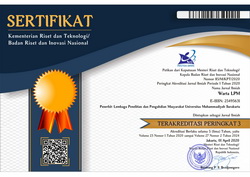Integrasi Kemampuan TPACK untuk Penguatan Kompetensi Pedagogi Guru SD Muhammadiyah se-Kecamatan Moyudan Sleman
DOI:
https://doi.org/10.23917/warta.v25i1.595Keywords:
pedagogic competence, tpack, primary school teacherAbstract
Based on the results of interviews conducted with teachers at SD Muhammadiyah Moyudan, it is known that there are obstacles in the implementation of online learning, including difficulties in providing learning so that two-way interaction does not occur, developing IT-based teaching materials, developing online learning evaluations, and teacher limitations. in using online applications and platforms. Therefore, there is a need for self-development for elementary school teachers in improving the ability of Technological Pedagogical Content Knowledge (TPACK). The purpose of this service is so that teachers can create and develop teaching materials with Kinemaster and evaluate learning using Google Form and Kahoot. This activity is carried out with a limited number of direct mentoring methods and integrated practice while still complying with the health protocol. The training implementation technique is carried out by demonstration, practice, discussion, mentoring. At the initial stage, it was done by demonstrating the introduction of various applications that can be used in online learning. Furthermore, the direct practice of making teaching materials and evaluation of online learning is carried out. The results of this activity are being able to develop TPACK-based learning tools, including the preparation of teaching materials using Kinemaster, Google forms, and Kahoot. The achievement of the results of this activity is 87.5% based on the results of the evaluation of the achievement of activities.
Downloads
References
Aç?kgül, K., & Aslaner, R. (2020). Effects of Geogebra supported micro teaching applications and technological pedagogical content knowledge (TPACK) game practices on the TPACK levels of prospective teachers. Education and Information Technologies. https://doi.org/10.1007/s10639-019-10044-y
Airawaty, D., & Widarjo, W. (2020). Facing Revolution Industrial 4.0 and Society 5.0 E-Learning be as Effective as Traditional Learning: Evidence From Indonesia. Proceedings of the 1st Progress in Social Science, Humanities and Education Research Symposium (PSSHERS 2019). https://doi.org/10.2991/assehr.k.200824.250
Akyuz, D. (2018). Measuring technological pedagogical content knowledge (TPACK) through performance assessment. Computers and Education. https://doi.org/10.1016/j.compedu.2018.06.012
Atun, H., & Usta, E. (2019). The effects of programming education planned with TPACK framework on learning outcomes. Participatory Educational Research, 6(2), 26–36. https://doi.org/10.17275/per.19.10.6.2
Beutel, D. (2010). The Nature of Pedagogic Teacher-student Interactions: A Phenomenographic Study. Australian Educational Researcher. https://doi.org/10.1007/BF03216923
Cavalcante, M. (2016). Fostering innovation in social work and social education degrees: multilingual environment and tools for social change. International Journal of Educational Technology in Higher Education, 13(1). https://doi.org/10.1186/s41239-016-0031-0
Coyle, D. (2008). CLIL—A pedagogical approach from the European perspective. Encyclopedia of Language and Education, 1200–1214.
Dewi, W. A. F. (2020). Dampak Covid-19 terhadap Implementasi Pembelajaran Daring di Sekolah Dasar. Edukatif?: Jurnal Ilmu Pendidikan, 2(1), 55–61. https://doi.org/10.31004/edukatif.v2i1.89
Fatikah, N., & Fildayanti. (2019). Strategi Kepala Sekolah Dalam Peningkatan Motivasi Dan Etos Kerja Guru Di Sekolah Menengah Atas Negeri Bareng Jombang. Indonesian Journal of Islamic Education Studies (IJIES). https://doi.org/10.33367/ijies.v2i2.989
Firman. (2020). Dampak Covid-19 terhadap Pembelajaran di Perguruan Tinggi. Bioma.
Gess-Newsome, J. (2015). A model of teacher professional knowledge and skill and PCK. In Re-Examining Pedagogical Content Knowledge in Science Education.
Hadiprayitno, G. (2016). Kompetensi Profesional Dan Pedagogi Mahasiswa Dalam Pelaksanaan Program Pengalaman Lapangan. Jurnal Cakrawala Pendidikan, 15(2), 292–300. https://doi.org/10.21831/cp.v15i2.8093
Kemdikbud. (2005). Undang-Undang No 14 tahun 2005 tentang Guru dan Dosen. Kemdikbud.
Koh, J. H. L. (2019). TPACK design scaffolds for supporting teacher pedagogical change. Educational Technology Research and Development, 67(3), 577–595. https://doi.org/10.1007/s11423-018-9627-5
Losius Goliong, Mohd Khairuddin, A., & Rosy Talin. (2016). Kompetensi peribadi, pedagogi, profesionalisme guru sekolah berprestasi rendah bahagian barat dan utara sabah. Jurnal Pendidikan Nusantara.
Mulyasa. (2013). Pengembangan dan Implementasi kurikulum 2013. Bandung: Remaja Rosadakarya.
Nazari, N., Nafissi, Z., Estaji, M., Marandi, S. S., & Wang, S. (2019). Evaluating novice and experienced EFL teachers’ perceived TPACK for their professional development. Cogent Education. https://doi.org/10.1080/2331186X.2019.1632010
Nurhamidah, I. (2018). Problematika Kompetensi Pedagogi Guru Terhadap. Jurnal Teori Dan Praksis Pembelajaran IPS.
Paimun, P., & Masruri, M. S. (2014). Pengembangan Subject Spesific Pedagogy Tematik untuk Meningkatkan Kejujuran dan Kedisiplinan Siswa Kelas I SD. Jurnal Prima Edukasia. https://doi.org/10.21831/jpe.v2i2.2719
Rahmadi, I. F. (2019). Technological Pedagogical Content Knowledge (TPACK): Kerangka Pengetahuan Guru Abad 21. Jurnal Pendidikan Kewarganegaraan. https://doi.org/10.32493/jpkn.v6i1.y2019.p65-74
Saubern, R., Henderson, M., Heinrich, E., & Redmond, P. (2020). TPACK-time to reboot? In Australasian Journal of Educational Technology (Vol. 36, Issue 3). https://doi.org/10.14742/AJET.6378
Sholihah, M., Yuliati, L., & Wartono. (2016). Peranan TPACK terhadap Kemampuan Menyusun Perangkat Pembelajaran Calon Guru Fisika dalam Pembelajaran Post-Pack. Jurnal Pendidikan: Teori, Penelitian, Dan Pengembangan.
Shulman, L. S. (1987). Shulman.1987.Knowledge and teaching.pdf. In Harvard Educational Review.
Sitinjak, D. S. (2021). Analisis Kompetensi Pedagogi dan Penguasaan Konsep Kimia Mahasiswa Calon Guru Kimia Yang Profesional. Edukatif?: Jurnal Ilmu Pendidikan. https://doi.org/10.31004/edukatif.v3i2.379
Suarmika, P. E. (2018). Teacher Pedagogic Competency and National Examination Result at Elementary School. SHS Web of Conferences. https://doi.org/10.1051/shsconf/20184200030
Sugiarto, A. (2020). Dampak Positif Pembelajaran Online dalam Sistem Pendidikan Keperawatan PascaPandemi Covid 19. Jurnal Perawat Indonesia. https://doi.org/10.32584/jpi.v4i3.555
Syafruddin, S. (2015). Meningkatkan Kompetensi Pedagogi Guru Melalui Lesson Study Menuju Mutu Pembelajaran Guru. Jurnal Pendidikan Fisika, 3(2), 43–59. https://doi.org/10.24127/jpf.v3i2.272
Syamratulangi, S., & Poerwanti, E. (2020). Analisis Tingkat Ketercapaian Kompetensi Pedagogi Dan Profesional Guru SMP Negeri 1 Hu’u Dompu. Jurnal Kebijakan Dan Pengembangan Pendidikan. https://doi.org/10.22219/jkpp.v7i1.11692
Syamratulangi, S., & Tinus, A. (2020). Analisis Tingkat Ketercapaian Kompetensi Pedagogi Dan Profesional Guru SMP Negeri 1 Hu’u Dompu. Jurnal Kebijakan Dan Pengembangan Pendidikan. https://doi.org/10.22219/jkpp.v7i1.12037
Tanak, A. (2020). Designing tpack-based course for preparing student teachers to teach science with technological pedagogical content knowledge. Kasetsart Journal of Social Sciences. https://doi.org/10.1016/j.kjss.2018.07.012
Wuryandani, W., Maftuh, B., . S., & Budimansyah, D. (2014). Pendidikan Karakter Disiplin di Sekolah Dasar. Jurnal Cakrawala Pendidikan. https://doi.org/10.21831/cp.v2i2.2168
Downloads
Submitted
Published
How to Cite
Issue
Section
License
Copyright (c) 2022 Warta LPM

This work is licensed under a Creative Commons Attribution 4.0 International License.















